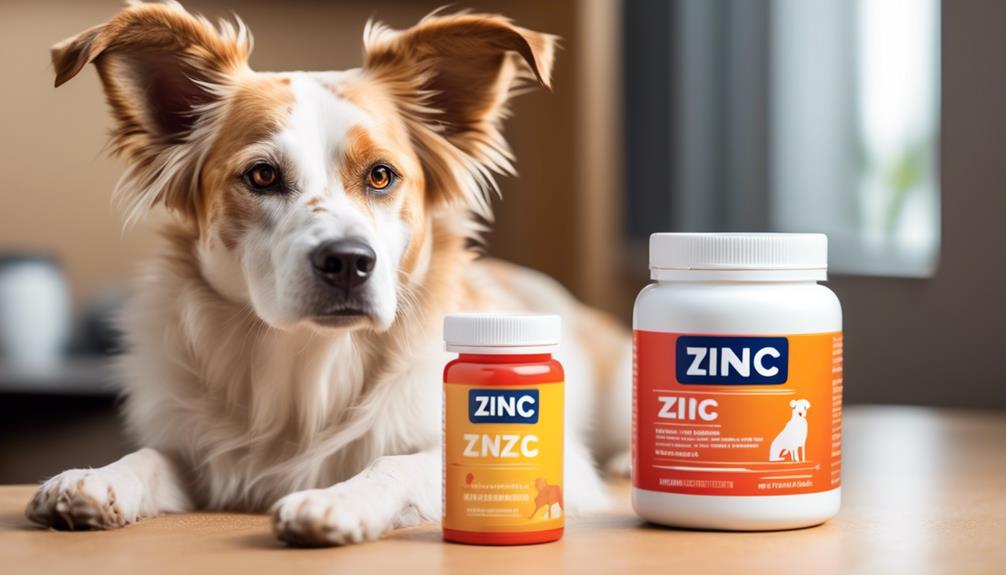What Supplements Improve Dog Skin Conditions?
If you're seeking solutions to soothe your pup's persistent skin problems, exploring the realm of supplements might be your best bet. Skin conditions in dogs can be a source of stress and discomfort for both you and your furry friend.
But have you ever wondered if there's more to the puzzle than just topical treatments and regular baths? You may be surprised to learn that there's a world of wonder waiting within the realm of doggie dietary supplements.
Omega-3 Fatty Acids
To improve your dog's skin condition, consider adding omega-3 fatty acids to their diet for healthier skin and a shinier coat. Omega-3 sources for dogs can come from various sources such as fish oil, flaxseed oil, and algae. These sources are rich in EPA (eicosapentaenoic acid) and DHA (docosahexaenoic acid), which are essential fatty acids that play a crucial role in maintaining your dog's skin health.
The benefits of omega-3 for dog skin health are significant. Omega-3 fatty acids have anti-inflammatory properties that can help alleviate skin conditions such as itching, redness, and overall irritation. By incorporating omega-3 into your dog's diet, you can help reduce the impact of allergic reactions that often manifest through skin issues. Additionally, omega-3 can contribute to a stronger skin barrier, which is essential for protecting your dog from environmental allergens and irritants.
When looking for omega-3 sources for your dog, consider high-quality fish oil supplements that are specifically designed for canine consumption. These supplements often come in liquid or capsule form and can be easily added to your dog's food. It's important to consult with your veterinarian to determine the appropriate dosage based on your dog's size and individual needs.
Probiotics
Consider incorporating probiotics into your dog's diet to promote a healthy balance of gut bacteria and potentially improve their skin condition. Probiotics are beneficial bacteria that can support gut health and the immune system, which in turn can have positive effects on your dog's skin.
Here are some reasons why probiotics may be beneficial for your dog's skin conditions:
- Gut Health: Probiotics aid in maintaining a healthy balance of gut bacteria, which can help improve digestion and nutrient absorption. A healthy gut can contribute to a reduction in skin inflammation and allergies, leading to healthier skin for your dog.
- Immune System Support: Probiotics play a crucial role in supporting the immune system. By promoting a strong and balanced immune response, probiotics can help manage inflammatory skin conditions and reduce the likelihood of allergic reactions.
- Reduction of Skin Inflammation: Probiotics have been shown to help reduce inflammation throughout the body, including the skin. By addressing internal imbalances, probiotics can potentially alleviate skin irritation and redness.
- Improved Skin Barrier Function: Probiotics can contribute to strengthening the skin barrier, which may help prevent allergens and irritants from penetrating the skin and causing reactions.
When choosing a probiotic supplement for your dog, opt for a high-quality product specifically formulated for canine use. Incorporating probiotics into your dog's diet can be a proactive step in promoting their overall well-being, including the health of their skin.
Antioxidants

Incorporate antioxidants into your dog's diet to help combat free radicals and support their skin health. Antioxidants are crucial for reducing oxidative stress in your dog's body, which can contribute to skin conditions. You can find these beneficial compounds in various food sources, including fruits like blueberries, cranberries, and apples, as well as vegetables such as spinach, kale, and sweet potatoes.
Additionally, incorporating omega-3 fatty acids, which are also known for their antioxidant properties, can further enhance your dog's skin health.
Antioxidants offer several health benefits for your dog's skin. They help neutralize free radicals, which are unstable molecules that can cause cellular damage. By doing so, antioxidants can aid in reducing inflammation and supporting the overall health of your dog's skin. Moreover, antioxidants can promote the repair of damaged skin cells and contribute to a healthier and more lustrous coat.
Incorporating these vital nutrients into your dog's diet can make a significant difference in managing and preventing skin conditions. Whether you choose to provide antioxidant-rich fruits and vegetables as treats or invest in high-quality dog food containing these essential nutrients, ensuring your dog receives a well-rounded diet is crucial for their skin health.
Vitamin E
You can support your dog's skin health by providing them with vitamin E, a crucial antioxidant that helps protect their skin from oxidative damage. Vitamin E benefits your dog's skin in several ways, promoting overall skin health improvements.
Here are some benefits of vitamin E for your dog's skin:
- Moisturization: Vitamin E helps to moisturize your dog's skin, reducing dryness and flakiness. It can be especially beneficial for dogs with dry, itchy skin conditions.
- Wound Healing: This antioxidant can aid in the healing of minor cuts, scrapes, and hot spots on your dog's skin. It helps to reduce inflammation and promote faster healing.
- Protection from UV Damage: Vitamin E acts as a natural barrier against UV radiation, which can help prevent sunburn and reduce the risk of skin cancer in dogs with light-colored fur or exposed skin.
- Anti-Inflammatory Effects: Vitamin E has anti-inflammatory properties that can help alleviate skin irritation and redness, providing relief for dogs with allergic reactions or other inflammatory skin conditions.
Zinc

Zinc plays a crucial role in maintaining your dog's skin health and can contribute to improving various skin conditions. Zinc deficiency can lead to a range of skin issues such as dermatitis, hair loss, and a compromised immune system. Ensuring that your dog receives an adequate amount of zinc is essential for promoting healthy skin and a shiny coat. However, it's important to note that too much zinc can also have adverse effects, leading to zinc toxicity.
Signs of zinc deficiency in dogs may include dry, flaky skin, slow wound healing, and a dull coat. If you suspect that your dog isn't getting enough zinc, it's important to consult with your veterinarian to determine the best course of action.
On the other hand, zinc toxicity can occur when dogs ingest excessive amounts of zinc, often from consuming metal objects or certain types of topical ointments. Symptoms of zinc toxicity may include vomiting, diarrhea, lethargy, and potential damage to the red blood cells.
To ensure your dog's skin health is optimal, it's crucial to provide a balanced diet that includes the right amount of zinc. High-quality commercial dog foods often contain adequate levels of zinc, but if your dog has specific skin conditions, your vet may recommend zinc supplements. Always consult with a professional before making any changes to your dog's diet or supplementation to avoid potential zinc-related issues.
Fish Oil
Consider adding fish oil to your dog's diet to promote healthy skin and coat. Fish oil is a fantastic supplement that can improve your dog's skin condition and overall health. Here are a few benefits of fish oil for your furry friend:
- Healthy Skin: Fish oil contains omega-3 fatty acids, which are known for their anti-inflammatory properties. These fatty acids can help alleviate skin allergies, itching, and irritation, leading to healthier and more comfortable skin for your dog.
- Shiny Coat: Omega-3 fatty acids also contribute to a lustrous and shiny coat for your dog. Regular supplementation with fish oil can help reduce shedding and improve the overall appearance of your dog's fur.
- Joint Health: In addition to benefiting the skin and coat, fish oil can also support joint health in dogs, particularly for older pets or those with arthritis. The anti-inflammatory properties of fish oil can help reduce joint pain and stiffness, promoting better mobility and overall comfort.
- Heart Health: Omega-3 fatty acids have been shown to support cardiovascular health in dogs, helping to maintain healthy heart function and circulation.
When it comes to dosage, it's essential to consult your veterinarian to determine the appropriate amount of fish oil for your dog based on their size, age, and specific health needs. Generally, a safe and effective dosage ranges from 20-55 mg of EPA (eicosapentaenoic acid) per pound of body weight.
Always opt for high-quality fish oil supplements specifically formulated for dogs, as some human supplements may contain ingredients that can be harmful to pets. With the right dosage and a high-quality product, fish oil can be a valuable addition to your dog's daily routine, supporting their skin, coat, and overall well-being.
Biotin

Adding to the benefits of fish oil for your dog's skin and coat, Biotin is another essential supplement that plays a crucial role in maintaining overall skin health. Biotin, also known as Vitamin H, is a B-complex vitamin that supports the health of your dog's skin, coat, and nails. It helps in maintaining the integrity of the skin and promoting a healthy, shiny coat. Biotin benefits extend beyond skin health, as it also aids in energy metabolism, digestion, and overall cellular health in dogs.
When it comes to Biotin dosage for your dog, it's essential to consult with your veterinarian to determine the appropriate amount. The recommended dosage of Biotin for dogs varies based on factors such as age, size, and specific health conditions. Typically, a dosage of 5-10 milligrams per day is considered safe and effective for maintaining your dog's skin and coat health. However, it's crucial to follow your vet's guidance to ensure the right dosage for your furry friend.
Evening Primrose Oil
Evening Primrose Oil is a popular supplement known for its potential benefits in managing skin conditions in dogs. This natural remedy has gained attention for its positive effects on skin health, making it a valuable addition to your dog's wellness routine.
Here's why Evening Primrose Oil is an excellent choice for improving your dog's skin health:
- Rich in Gamma-Linolenic Acid (GLA): Evening Primrose Oil is packed with GLA, an omega-6 fatty acid that plays a crucial role in maintaining healthy skin. GLA helps to support the skin's structure and function, aiding in the management of various skin conditions in dogs.
- Anti-Inflammatory Properties: The GLA in Evening Primrose Oil also possesses anti-inflammatory properties, which can help alleviate skin irritation, itching, and redness. By reducing inflammation, Evening Primrose Oil may contribute to a healthier and more comfortable skin for your dog.
- Moisturizes the Skin: Dogs suffering from dry, itchy skin can benefit from the moisturizing properties of Evening Primrose Oil. By improving skin hydration, this supplement can help combat the discomfort associated with dry skin conditions.
- Supports Overall Skin Function: Evening Primrose Oil supports the skin's natural barrier function, helping to enhance its resilience against environmental stressors and allergens. This can contribute to improved skin health and a reduced likelihood of developing skin issues.
Incorporating Evening Primrose Oil into your dog's daily regimen can be a proactive step in promoting healthy skin and addressing various skin concerns naturally.
Frequently Asked Questions
Can I Use These Supplements in Combination With Prescription Medications for My Dog's Skin Condition?
You can use supplements with prescription medications for your dog's skin condition, but be cautious of potential interactions and safety concerns. It's important to consult your veterinarian before combining any supplements with prescription medications.
Are There Any Potential Side Effects or Risks Associated With Giving My Dog These Supplements?
When giving your dog supplements, it's important to be aware of potential risks and drug interactions. Always consult your vet to ensure the supplements won't cause adverse effects or interact with any medications your dog is taking.
How Long Will It Take to See an Improvement in My Dog's Skin Condition After Starting These Supplements?
You should expect to see improvement in your dog's skin condition within a few weeks of starting these supplements. It's important to monitor progress and consult your vet if you don't see any changes.
Are There Any Specific Dosage Recommendations for Each of These Supplements Based on My Dog's Size and Breed?
When determining dosage recommendations for your dog, it's important to consider their size and breed. Breed specific dosages can help ensure that your dog is getting the right amount of supplements to improve their skin condition.
Can I Give These Supplements to My Dog if They Are Pregnant or Nursing?
During pregnancy, consult a vet about dietary restrictions and supplement safety. Nutritional needs change during lactation, so discuss giving supplements with the vet. Ensure the supplements won't harm the pregnant or nursing dog.
Conclusion
Overall, incorporating supplements like Omega-3 fatty acids, probiotics, antioxidants, vitamin E, zinc, fish oil, biotin, and evening primrose oil can greatly improve your dog's skin conditions.
These supplements help promote healthy skin, reduce inflammation, and support overall skin health.
Be sure to consult with your veterinarian before adding any new supplements to your dog's diet to ensure they're safe and appropriate for your pet's specific needs.
